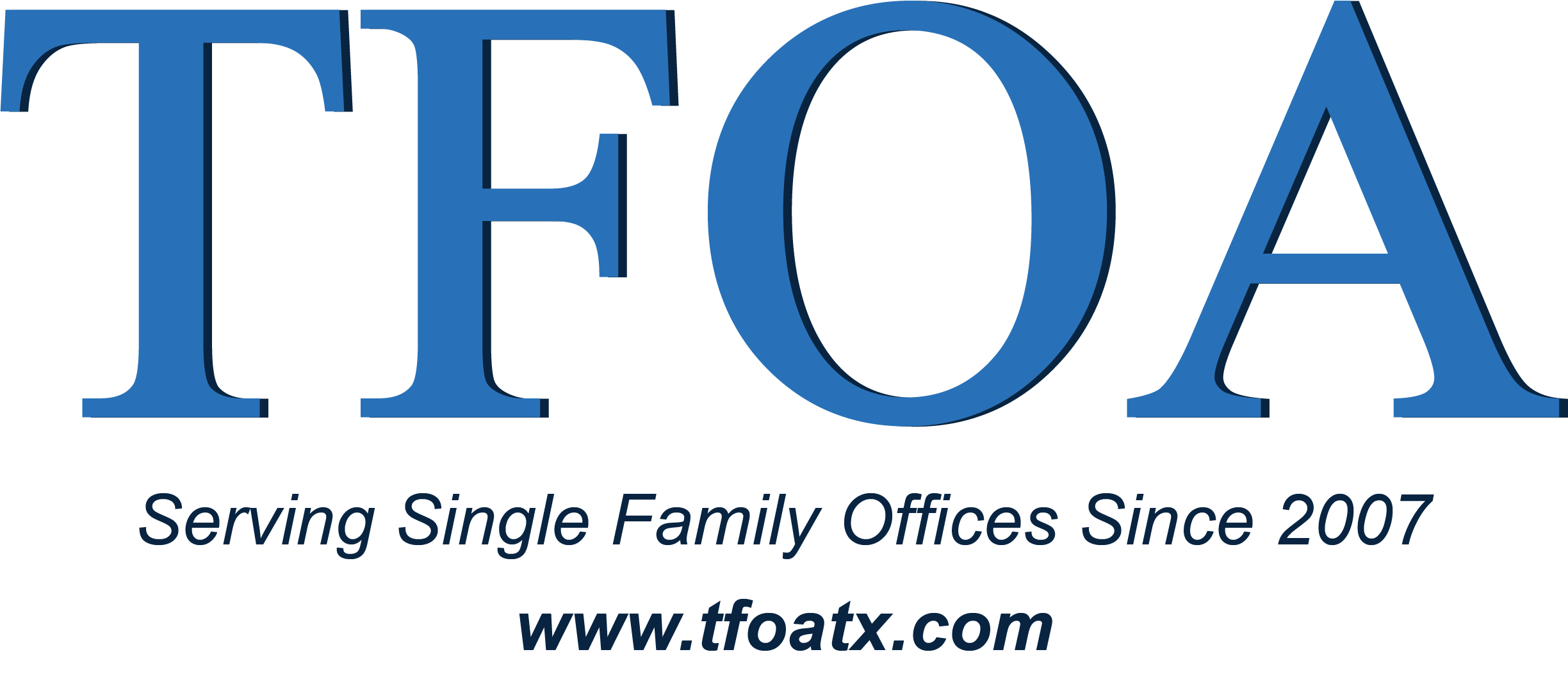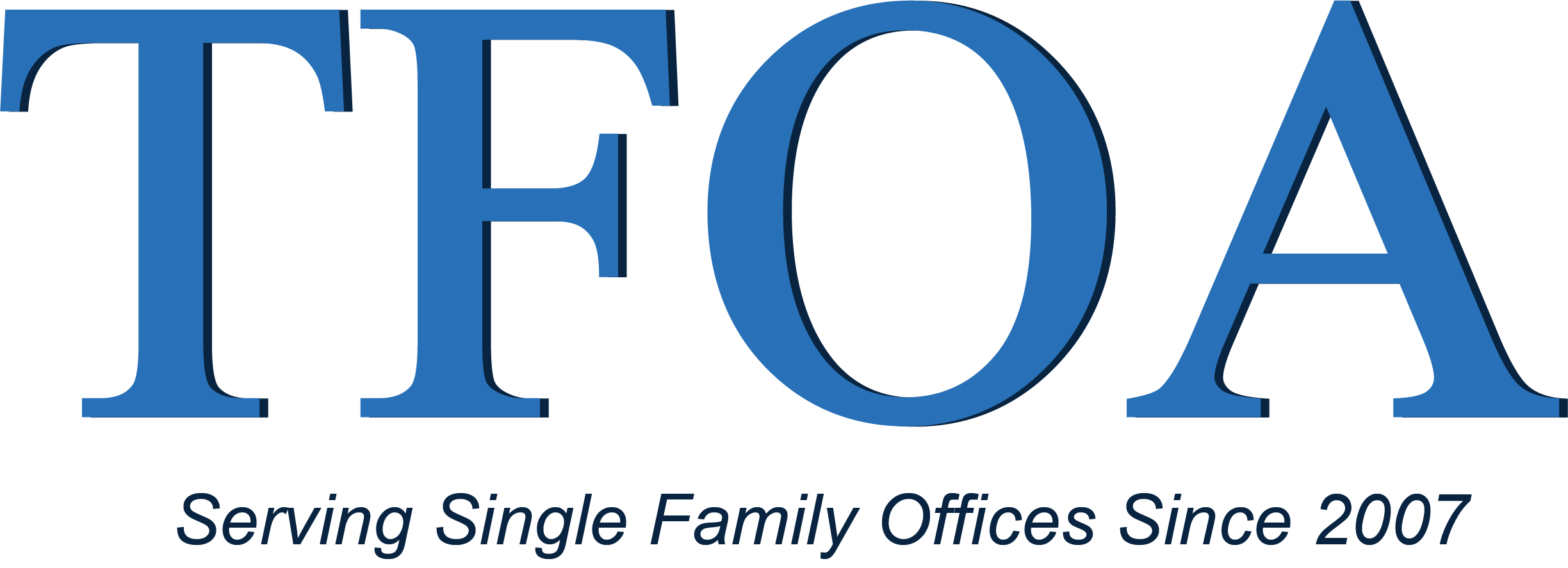Thoughts on Single Family Office Infrastructure

The structure of your SFO will depend on the jurisdiction(s) in which it will operate and the types of investments the family owns or intends to own...
Many SFOs in the USA are structured as limited partnerships or limited liability companies and are organized similarly to hedge fund management companies (i.e. the SFO entity does not own any of the assets it manages; rather, it is a service entity that provides services to the SFO's clients on a contract basis). It is highly recommended you engage with experienced securities counsel who have worked with other family offices regarding the potential impact of SEC rules on their structure and operations.
Dodd Frank and SEC RIA Registration
Under the Dodd-Frank Wall Street Reform and Consumer Protection Act, an organized effort was undertaken by single family offices nationwide that successfully convinced Congress to exempt SFO's meeting certain criteria from the definition of investment adviser under the Investment Advisers Act of 1940 (previously, such family offices were deemed to be investment advisers and relied on the 'less than 15 clients' rule to avoid registration under the Act, a rule that was eliminated under Dodd-Frank). The Securities and Exchange Commission (SEC) promulgated the final 'family office rules' on June 22, 2011. An SFO that does not fit within the definition of a 'family office' or qualify for an exemption as a bank trust company must register with the SEC. While some family offices have opted affirmatively to register with the SEC, others are greatly burdened by the increased administrative burden and loss of privacy that registration imposes.
Any individual or entity providing 'investment advice' must register as a Registered Investment Advisor (RIA) unless an exemption is available. Registration can be costly and entails detailed disclosures that families typically are reluctant to make. An RIA must maintain and preserve specified books and records and make them available to Commission examiners for inspection.
An RIA must also implement substantive compliance programs, prepare, and file reports with the SEC, and provide detailed written disclosures to their clients (known as ADVs). Every RIA is subject to SEC audit. Failure to register may subject an advisor to criminal and civil sanctions and penalties. SFOs may avoid registration by:
1. Structuring ownership and operations to fit within the 'family office' exemption to RIA registration;
2. Outsourcing investment responsibility to one or more third party RIAs; or
3. Establishing a Private Trust Company (PTC).
Private Trust Company
With a Private Trust Company ('PTC'), a familycreated entity, rather than a third party, serves as trustee of the family's trusts. Private Trust Companies are sometimes recommended by advisors as a mechanism to avoid RIA registration, but PTCs may also offer substantial additional benefits for the SFO:
1. Greater privacy and confidentiality;
2. Common administrative and decision-making policies for all trusts;
3. More knowledgeable and focused fiduciary oversight for family businesses, alternative investments, start-ups, real estate, and other non-public investments held in trust;
4. Better understanding and knowledge of family circumstances and needs of beneficiaries.
5. Greater participation and input by the family than would be possible if an outside, third party served as trustee;
SFOs seeking to establish a PTC primarily to avoid RIA registration are advised to consult knowledgeable securities counsel with experience advising family offices.
Structuring Investments
The various investments managed by an SFO are typically held in individual limited liability entities, to reduce the risk that losses and liabilities from one investment will affect another. For example, if the SFO holds commercial real estate, each parcel of real property is best held in a separate entity. If a passer-by slips on the sidewalk in front of one building, incurs a severe head injury and sues for medical expenses and lifetime maintenance, any liability in excess of the SFO's casualty coverage will be limited to the assets of the entity that owns that building, thereby protecting assets held in other entities.
SFOs are increasingly utilizing sophisticated holding structures such as tracking partnerships. A tracking partnership permits family office clients to hold different partnership assets in different percentages, with performance results tracking accordingly. By way of example, assume the tracking partnership has four separate classes of interests: Class B (bond portfolio), Class S (indexed stock portfolio), Class A (alternatives portfolio) and Class R (REIT portfolio).
--Partner 1, an individual seeking a broadly diversified portfolio, might hold a 10% interest in Class B, a 10% interest in Class S, a 20% interest in Class A and a 15% interest in Class R.
--Partner 2, a trust intended to fund education expenses for Partner 1's 10 grandchildren, might hold 40% of Class B and only 5% of each of the other classes.
--Partners 3, 4, and 5 would hold the balance of the interests in each Class, each in accordance with their individual investment goals.
A tracking partnership gives partners the investment flexibility they would have if they formed several partnerships but permits them to trade between classes from time to time without recognizing gain or loss for tax purposes. Such partnerships offer considerable flexibility, custom tailoring of client portfolios, and a consistent governance model for SFO clients. However, they also bring with them complex tax, accounting, and reporting issues, and so need to be designed with the help of knowledgeable legal and accounting counsel and managed with care.
Carried Interests
A carried interest is a share of profits from a partnership or LLC that is paid to a participant who did not provide any capital to the venture. A carried interest may provide a tax-efficient mechanism to fund family office expenses and may be used to structure incentive compensation opportunities for SFO staff. Particularly considering Dodd Frank and the SEC's family office exemption, staff participation in SFO investments should be reviewed to ensure that they do not unintentionally trigger RIA registration requirements. SFOs are strongly advised to seek guidance from tax and accounting advisors before putting in place any carried interest structure or incentive compensation plan for SFO staff.
Insurance
A critical task for any SFO will be monitoring and managing risk for the family. Property and casualty, liability, health, and life insurance typically will be overseen and coordinated by SFO staff through relationships with an insurance firm that has experience working with SFOs and a comprehensive offering of insurance products. Certain assets, such as private jets and other aircraft, require unique holding structures, insurance coverage and regulatory compliance.
As the SFO grows and its clients and investments change over time, it is a good idea for the family and CEO to undertake a structural audit from time to time, to make sure that the SFO structure is optimal for its purpose. The audit may uncover opportunities for eliminating or reorganizing holding entities within the structure, thereby reducing reporting, accounting, and compliance expenses for the SFO.
Business-Owning Families
Many business-owning families create a family office within the business administrative group. The company's accounting team handles personal tax filings and financial record-keeping, while administrative staff keep track of insurance, record-keeping, and bill-paying. The benefits of an embedded SFO are obvious: the family can leverage an existing resource, so the family office appears to be extremely cost-effective.
However, there are serious drawbacks to setting up your SFO in this way. First and foremost, the focus of a family office (i.e. wealth preservation) will be very different from the focus of the operating business (i.e. wealth creation). A dual staff will often struggle to manage the varied responsibilities and objectives, and skills that are critical in the business may not necessarily translate into the family office realm. For example, partnership accounting and reporting for trusts and complex investment structures is very different to corporate accounting, and staff may lack the time, training, and technology to handle both jobs well. The legal structure and governance of an SFO will also be quite different than those of the business, and mistakes may occur when business practices are automatically carried over to the family office. Lastly, priorities may be unclear, such that if an emergency occurs in both the business and family office, at the same time, there may be significant conflict or a lack of sufficient resources to tackle both. Risks of gaps in reporting and compliance increase exponentially when the same staff are responsible for both the business and the family office.
Families with operating businesses are recommended to seriously explore developing a separate family office to handle their personal investments and manage their non-business assets. Having a separate office provides for greater privacy and confidentiality and allows for hiring staff with the specific skillsets required by the family office. A dedicated family office staff, not subject to the hiring practices of the corporation, will facilitate the development of an SFO-specific organization chart, with separate responsibilities, compensation, and work practices. This will also allow for a longer-range focus for the family's personal strategic planning, as distinct from that of the operating business.
Building the family office apart from the business also increases opportunities for involvement of family members who don't participate in the business. By expanding family involvement, the SFO can become a force for strengthening family cohesion. Some families are using their SFOs to create entrepreneurial venture funds, investing in promising new businesses and technologies, and thereby increasing the odds of growing rather than simply preserving the family's capital.
TFOA is an affinity group dedicated primarily to the interests of Single Family Offices. TFOA is intended to provide members with educational information and a forum in which to exchange information of mutual interest. TFOA does not participate in the offer, sale or distribution of any securities nor does it provide investment advice. Further, TFOA does not provide tax, legal or financial advice. Materials distributed by TFOA are provided for informational purposes only and shall not be construed to be a recommendation to buy or sell securities or a recommendation to retain the services of any investment adviser or other professional adviser. The identification or listing of products, services, links or other information does not constitute or imply any warranty, endorsement, guaranty, sponsorship, affiliation or recommendation by TFOA. Any investment decisions you may make based on any information provided by TFOA is your sole responsibility. The TFOA logo and all related product and service names, designs, and slogans are the trademarks or service marks of The Texas Family Office Association. All other product and service marks on materials provided by TFOA are the trademarks of their respective owners. All of the intellectual property rights of TFOA or its contributors remain the property of TFOA or such contributor, as the case may be, such rights may be protected by United States and international laws and none of such rights are transferred to you as a result of such material appearing on the TFOA web site. The information presented by TFOA has been obtained by TFOA from sources it believes are reliable. However, TFOA does not guarantee the accuracy or completeness of any such information. All such information has been prepared and provided solely for general informational purposes and is not intended as user specific advice.
